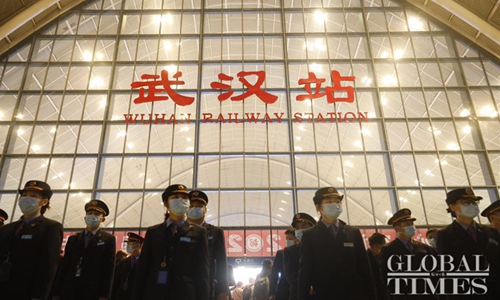Wuhan lockdown prevents 12-42 million people from catching COVID-19: study
By Liu Caiyu Source:Global Times Published: 2020/4/27 1:39:18

Wuhan railway station reopens 76 days after city lockdown. Photo:GT
The "decisive" lockdown imposed in Wuhan, capital of Central China's Hubei Province largely cut off the COVID-19 infections, preventing 500,000 to 3 million more infections in China and 12 to 42 million more infections in the globe, according to a Chinese expert at Peking Union Medical College.
Liu Yuanli, head of the school of public health in Peking Union Medical College revealed the data during a live-streaming seminar at Tsinghua University on Saturday.
The Wuhan lockdown effectively cut off the spread of COVID-19, Liu said. The lockdown helped reduce 500,000 to 3 million infections in China and 12 to 42 million infections globally, he said.
Wuhan imposed the citywide lockdown on January 23, a day before the annual Chinese Lunar New Year's eve.
If the lockdown wasn't imposed on that day, then the next day would have seen the peak of population flow for Chinese family reunions at Spring Festival, Liu said.
The Wuhan lockdown sent a "very clear signal" about the upcoming epidemic and won "much time" for the world, Yang Zhanqiu, deputy director of the pathogen biology department at Wuhan University, told the Global Times on Sunday.
China's stringent measures significantly slowed the global spread of the virus and earned a window period for the world.
Rather than thanking China for reporting the virus and taking such decisive measures to contain the virus spread, some outside China are surprisingly trying to blame China for concealing the epidemic and hyping Wuhan is the virus origin, which is absurd and unreasonable, Yang said.
Wuhan sacrificed itself by locking the city and asking millions of residents to stay at home in a timely manner when facing the COVID-19 epidemic, which is a common enemy of the mankind. How come people are still trying to take China as a scapegoat for the pandemic, experts said.
The study offered strong evidence of how much Wuhan lockdown is essential for the worldwide pandemic, however, miscommunication and underestimation were repeated not only in Europe but also in the US, where governments and officials failed to prevent infections from exploding in their countries, Chinese experts noted.
"Closure of a city in the fight against epidemics has never happened not only in China, but such a large-scale city lockdown has never happened in the history of the world epidemic prevention," said Liu, of Peking Union Medical College at the live-streaming event on Saturday.
Wuhan was locked at just the right time. "The lockdown sent a signal to the whole country that the overall battle against the epidemic was starting," Liu said.
There were more than 400 confirmed cases on January 22 in Wuhan and on the next day on January 23, Wuhan adopted strict measures to restrict people from leaving the city.
It later proved that the week after January 23 was a crucial week, Liu noted.
If the city was closed one day or one week later, the impact of the epidemic would be "huge," Liu said.
"Facts also proved," Liu said, that 63 percent of that more than 80,000 cases diagnosed nationwide were in Wuhan.
The Wuhan lockdown was not simply a restriction on traffic but an overall anti-epidemic policy for a city: medical treatment for patients, community closed-loop management, mass screening and quarantine of residents, Liu noted.
Posted in: SOCIETY